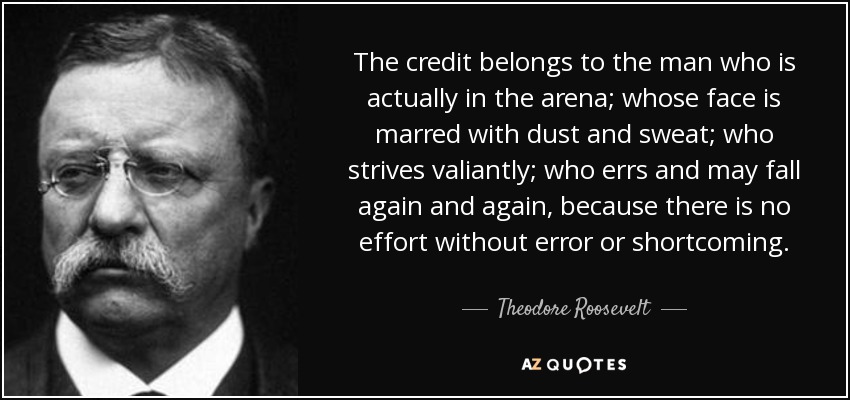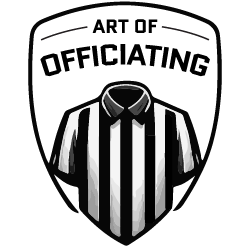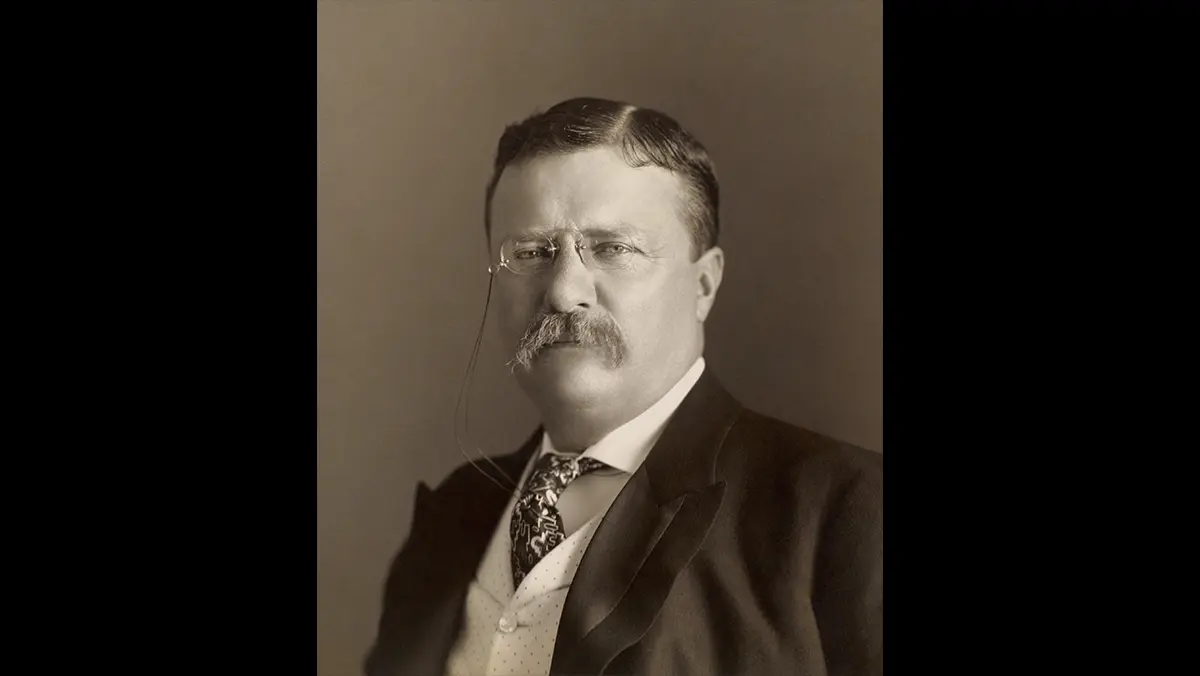
In 1995 I served as the Fourth-Class Training Director at the United States Air Force Academy. In that role, I was the editor for Contrails, the handbook issued to basic cadets upon arrival. The “Basics” were required to memorize large portions of the handbook, including patriotic and leadership-related quotes. (If you ever run into a USAFA graduate, I’ll be you a dollar he or she can recite Schofield’s quote without error!)
As I oversaw editing and printing Contrails, I decided to add my favorite quote, “Man in the Arena.” On April 23, 1910, Former US President Theodore Roosevelt delivered the “Citizenship in a Republic” speech in Paris to a crowd of 25,000. His words drew a 2-minute applause, and the “Man in the Arena” portion still resonates and inspires, today.
“It is not the critic who counts; not the man who points out how the strong man stumbles, or where the doer of deeds could have done them better. The credit belongs to the man who is actually in the arena, whose face is marred by dust and sweat and blood; who strives valiantly; who errs, who comes short again and again, because there is no effort without error and shortcoming; but who does actually strive to do the deeds; who knows great enthusiasms, the great devotions; who spends himself in a worthy cause; who at the best knows in the end the triumph of high achievement, and who at the worst, if he fails, at least fails while daring greatly, so that his place shall never be with those cold and timid souls who neither know victory nor defeat.” (Bold added)
I will never forget a “small town” game I worked over a decade ago.
The visiting team was physically superior to the home team and manhandled their opponents the entire game. As is sometimes the case in a contest with such a mismatch in size and talent, we threw multiple flags on the visiting team for unnecessary roughness and unsportsmanlike conduct.
Remarkably, we didn’t enforce a single foul on the home team. As we departed the field through the end zone, one of the fans from the visiting team raced over yelling, “I want your names! This is not ballet! You need to let the kids play! You’re horrible!”
We ignored him and sat in an equipment shed to wait for the athletic director to pay us for the game. As we waited, the visiting team’s fans walked by and many of them yelled insults at us. This was after their team had beaten the home team by 40 points!
If you’ve worked at least a handful of games, you’ve had the experience of walking off the field feeling emotional weariness, frustration, indignation, or other negative feelings. You’ve heard the catcalls from the stands, sometimes after you’ve correctly adjudicated a play according to high school rules that the fans don’t understand. (During a playoff game 2 years ago, a wing heard a fan yell, “Why don’t you go home and read the rule book and then kill yourself!”)
In the article, “Emotional Intelligence and Sports Officiating,” I wrote
Angry fans believe they are entitled to be angry; they’ve paid the price of admission, and unfortunately, they think it’s acceptable to hurl insults from the stands. Some parents have lost perspective on the benefit of sports in our society and have somehow tied their identity and value to the performance of their children. Moreover, most parents and fans lack advanced rules knowledge and often rely on what they’ve observed on television to form an opinion.
Why am I sharing one of my favorite quotes with you?
The purpose of this article is not to promote an “us versus them” mentality. It’s unhealthy to harbor a dislike or disdain for fans who hurl insults or boo us from the stands. Notice I didn’t bold the last sentence of the quote: “…those cold and timid souls who neither know victory nor defeat.” It’s unfair to determine the fans are somehow inferior to high school football officials. The fans, regardless of their behavior, enjoy victory in other areas of their lives.
It is incongruous for a sports official to always expect virtuous behavior from parents, fans, and coaches.
Randy Campbell, the Rocky Mountain Athletic Conference Coordinator of Football Officials commented:
“Accept by the very nature of the game, there will be numerous instances for the potential of volatile situations to surface. Conflict will happen in almost every game. Don’t let it get you down.”
When we decided to don a striped shirt and hang a whistle around our necks, we entered into an informal contract with the game of football. We get to participate in this high-energy, stressful, emotional game; and unfortunately, conflict is part of the contract.
I want to encourage you.
The next time you depart the field weary and frustrated, remind yourself why you are officiating high school football. I officiate because I enjoy interacting with the players, I love the energy of “Friday Night Lights,” I appreciate the friendships and camaraderie I have with my fellow officials, I enjoy the challenge of officiating a competitive game played by highly-skilled athletes, and I enjoy being outdoors in the Colorado sunshine. Those benefits far outweigh the negative energy some people contribute throughout the season.

